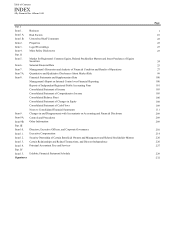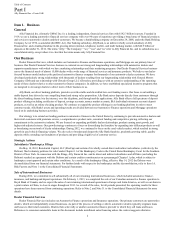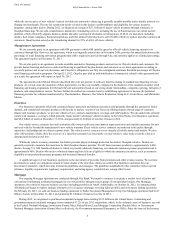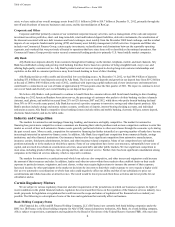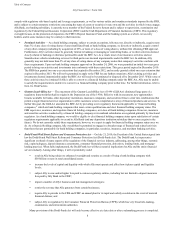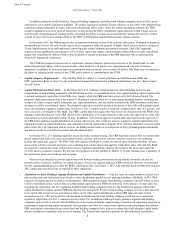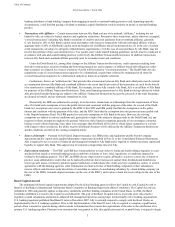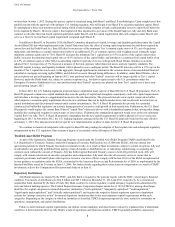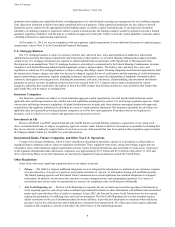Ally Bank 2012 Annual Report Download - page 7
Download and view the complete annual report
Please find page 7 of the 2012 Ally Bank annual report below. You can navigate through the pages in the report by either clicking on the pages listed below, or by using the keyword search tool below to find specific information within the annual report.5
comply with regulatory risk-based capital and leverage requirements, as well as various safety and soundness standards imposed by the FRB,
and is subject to certain statutory restrictions concerning the types of assets or securities it may own and the activities in which it may engage.
Ally Bank, our banking subsidiary, is currently not a member of the Federal Reserve System and is subject to supervision, examination and
regulation by the Federal Deposit Insurance Corporation (FDIC) and the Utah Department of Financial Institutions (UDFI). This regulatory
oversight focuses on the protection of depositors, the FDIC's Deposit Insurance Fund, and the banking system as a whole, not security
holders, and in some instances may be contrary to their interests.
• Permitted Activities — As a bank holding company, subject to certain exceptions, Ally may not, directly or indirectly, acquire more
than 5% of any class of voting shares of any nonaffiliated bank or bank holding company, or, directly or indirectly, acquire control
of any other company (including by acquisition of 25% or more of a class of voting shares), without first obtaining FRB approval.
Furthermore, Ally's activities must be generally limited to banking or managing or controlling banks, or to other activities deemed
closely related to banking or otherwise permissible under the BHC Act. As a result, most of our insurance activities and our
SmartAuction vehicle remarketing services for third parties are deemed impermissible under the BHC Act. In addition, Ally
generally may not hold more than 5% of any class of voting shares of any company unless that company's activities conform with
these requirements. Upon our bank holding company approval on December 24, 2008, we were permitted an initial two-year grace
period to bring our activities and investments into conformity with these restrictions. This grace period expired in December 2010.
The FRB then granted two one-year extensions that expired in December 2012, and recently granted a third one-year extension that
expires in December 2013. We will not be permitted to apply to the FRB for any further extensions. Ally's existing activities and
investments deemed impermissible under the BHC Act will need to be terminated or disposed of by December 2013. While some of
these activities may be continued if Ally is able to convert to a financial holding company under the BHC Act, Ally may be unable
to satisfy the requirements to enable it to convert to a financial holding company prior to that time. For further information, refer to
Item 1A. Risk Factors.
• Gramm-Leach-Bliley Act — The enactment of the Gramm-Leach-Bliley Act of 1999 (GLB Act) eliminated large parts of a
regulatory framework that had its origins in the Depression era of the 1930s. Effective with its enactment, new opportunities
became available for banks, other depository institutions, insurance companies, and securities firms to enter into combinations that
permit a single financial services organization to offer customers a more comprehensive array of financial products and services. To
further this goal, the GLB Act amended the BHC Act by providing a new regulatory framework applicable to “financial holding
companies,” which are bank holding companies that meet certain qualifications and elect financial holding company status. The
FRB supervises, examines, and regulates financial holding companies, as it does all bank holding companies. However, insurance
and securities activities conducted by a financial holding company or its nonbank subsidiaries are regulated primarily by functional
regulators. As a bank holding company, we would be eligible to elect financial holding company status upon satisfaction of certain
regulatory requirements applicable to us and to Ally Bank (and any depository institution subsidiary that we may acquire in the
future). We do not currently satisfy these requirements, however, we expect to apply for financial holding company status once we
do. As a financial holding company, Ally would then be permitted to engage in a broader range of financial and related activities
than those that are permissible for bank holding companies, in particular, securities, insurance, and merchant banking activities.
• Dodd-Frank Wall Street Reform and Consumer Protection Act — On July 21, 2010, the President of the United States signed into
law the Dodd-Frank Wall Street Reform and Consumer Protection Act (Dodd-Frank Act). The Dodd-Frank Act represents a
significant overhaul of many aspects of the regulation of the financial services industry, addressing, among other things, systemic
risk, capital adequacy, deposit insurance assessments, consumer financial protection, derivatives, lending limits, and mortgage-
lending practices. When fully implemented, the Dodd-Frank Act will have material implications for Ally and the entire financial
services industry. Among other things, it will or potentially could:
• result in Ally being subject to enhanced oversight and scrutiny as a result of being a bank holding company with
$50 billion or more in total consolidated assets;
• increase the levels of capital and liquidity with which Ally must operate and affect how it plans capital and liquidity
levels;
• subject Ally to new and/or higher fees paid to various regulatory entities, including but not limited to deposit insurance
fees paid by Ally Bank to the FDIC;
• impact a number of Ally's business and risk management strategies;
• restrict the revenue that Ally generates from certain businesses;
• require Ally to provide to the FRB and FDIC an annual plan for its rapid and orderly resolution in the event of material
financial distress; and
• subject Ally to regulation by the Consumer Financial Protection Bureau (CFPB), which has very broad rule-making,
examination, and enforcement authorities.
Many provisions of the Dodd-Frank Act will only become effective at a later date or after a rulemaking process is completed.
Table of Contents
Ally Financial Inc. • Form 10-K


